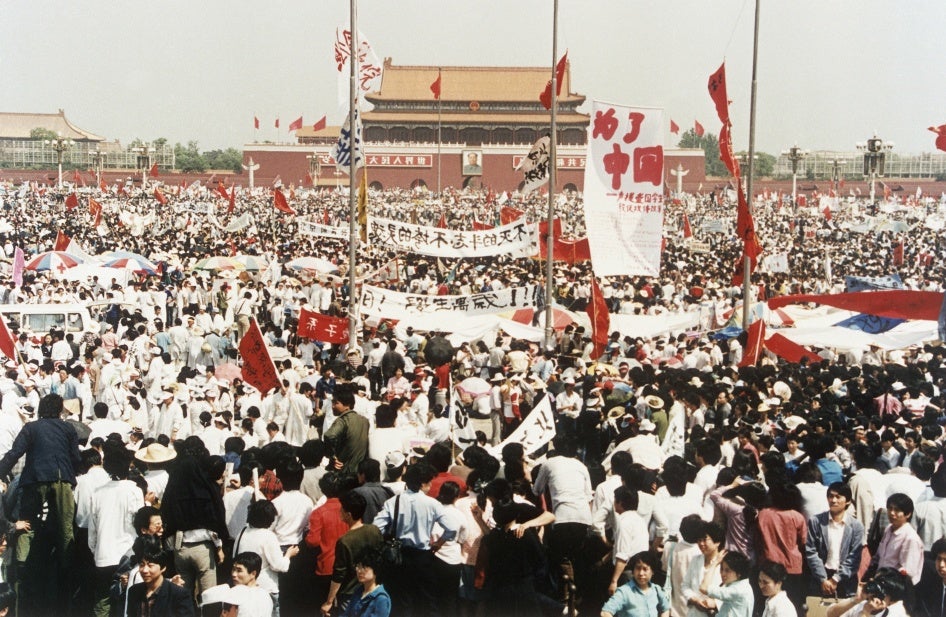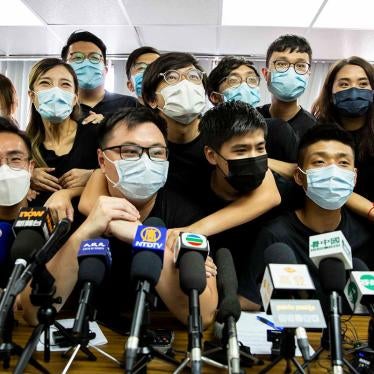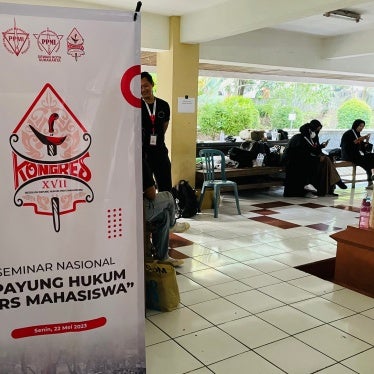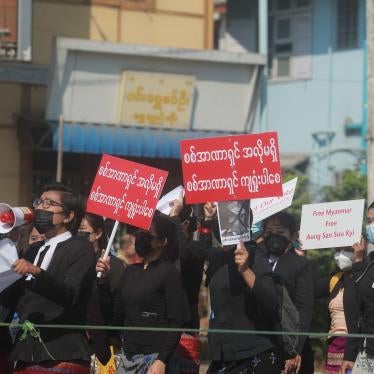(New York) – The Chinese government is further suppressing any discussion and commemoration of the 1989 Tiananmen Massacre, Human Rights Watch said today. Leading up to the 35th anniversary of the Tiananmen Massacre on June 4, 2024, Chinese authorities have again preempted commemorations.
The government has imprisoned those in China and Hong Kong who have sought to honor the memory of the victims, while refusing to acknowledge responsibility for the mass killings or provide redress for victims and their families.
“The Chinese government is seeking to erase memory of the Tiananmen Massacre throughout China and in Hong Kong,” said Maya Wang, acting China director at Human Rights Watch. “But 35 years on, the government has been unable to extinguish the flames of remembrance for those risking all to promote respect for democracy and human rights in China.”
On April 3, Xu Guang (徐光), a 1989 student leader, was sentenced to four years in prison for “picking quarrels and provoking trouble” after he demanded that the Chinese government acknowledge the Tiananmen Massacre and held a sign calling for redress at a local police station in May 2022. Xu was reportedly tortured, shackled, and mistreated while in detention.
Tiananmen Mothers, a group of relatives of victims of the 1989 massacre, reported that one of their founders, Zhan Xianling, is under surveillance with guards outside her home. Other activists connected to the 1989 democracy movement including Pu Zhiqiang, a human rights lawyer who had been a student representative at Tiananmen, and Ji Feng, a student leader in Guizhou, are similarly under tightened police surveillance or taken away from their homes.
On May 28 and 29, Hong Kong police arrested seven people, including the already detained lawyer-activist Chow Hang-tung (鄒幸彤), and her 65-year-old mother, for alleged “seditious” posts regarding an “upcoming sensitive date.” Chow was one of the organizers of Hong Kong’s annual Tiananmen vigil with the now-disbanded Hong Kong Alliance in Support of Patriotic Democratic Movements of China. These were the first arrests under the city’s recently adopted Safeguarding National Security Ordinance, known as “Article 23,” which punishes peaceful speech and civil society activism with heavy prison sentences.
In January, Hong Kong’s Court of Final Appeal overturned Chow’s acquittal. She had been acquitted of the charge of “inciting others to take part in an unauthorized assembly” in December 2022. The United Nations Working Group on Arbitrary Detention has determined that Chow’s arrest and detention were arbitrary and has called for her immediate and unconditional release.
Chow and two other members of the Hong Kong Alliance also face potential life sentences on charges of “inciting subversion” under Hong Kong’s draconian National Security Law and are awaiting a trial date.
In November 2023, Hong Kong authorities did not renew the work visa of a Canadian-Chinese history professor, Rowena He. The Chinese University of Hong Kong subsequently fired her. She is the author of Tiananmen Exiles: Voices of the Struggle for Democracy in China, which the authorities removed from Hong Kong public libraries in May 2023.
The Chinese government has long ignored domestic and international calls for justice for the Tiananmen Massacre. Some of the sanctions that the European Union and United States imposed at the time have over the years been weakened or evaded. The lack of a sustained and coordinated international response to the Tiananmen Massacre and ensuing crackdown has contributed to Beijing’s increasingly brazen human rights violations.
These include crimes against humanity against Uyghurs and other Turkic Muslims in Xinjiang, the imposition of two national security laws in Hong Kong that have suppressed the city’s long-protected freedoms, deepening repression in Tibet, and the persecution of human rights defenders throughout the country.
The Chinese government’s largely unchecked and expanding abuses across its borders, including its role in the abduction of Chinese activists living abroad, its exports of surveillance systems, and its efforts to undermine UN human rights mechanisms, all increasingly threaten human rights globally.
The Tiananmen Massacre was precipitated by the peaceful gatherings of students, workers, and others in Beijing’s Tiananmen Square and other Chinese cities in April 1989, calling for freedom of expression, accountability, and an end to corruption. The government responded to the intensifying protests in late May 1989 by declaring martial law.
On June 3 and 4, People’s Liberation Army soldiers fired upon and killed untold numbers of peaceful protesters and bystanders. In Beijing, some citizens attacked army convoys and burned vehicles in response to the military’s violence.
Following the killings, the government carried out a nationwide crackdown and arrested thousands of people on “counter-revolution” and other criminal charges, including arson and disrupting social order.
The government has never accepted responsibility for the massacre or held any officials legally accountable for the killings. It has been unwilling to investigate the events or release data on those who were killed, injured, forcibly disappeared, or imprisoned. Tiananmen Mothers documented the details of 202 people who were killed during the suppression of the movement in Beijing and other cities.
On the 35th anniversary of the Tiananmen Massacre, the Chinese government should take the following steps:
- Respect the rights to freedom of expression, association, and peaceful assembly, and cease the harassment and arbitrary detention of those who challenge the official account of the Tiananmen Massacre;
- Meet with and apologize to members of the Tiananmen Mothers, publish the names of all who died or were wrongfully imprisoned, and appropriately compensate the victims’ families;
- Permit an independent public inquiry into the Tiananmen Massacre and its aftermath, and promptly publish the findings and conclusions;
- Allow without conditions the return of Chinese citizens who were exiled due to their connections to the events of 1989; and
- Investigate all government and military officials who planned or ordered the unlawful use of lethal force against demonstrators and appropriately prosecute them.
Foreign governments should renew efforts to hold the Chinese government accountable by supporting the June 2020 call by 50 UN human rights experts urging the UN Human Rights Council to establish an independent UN mandate to monitor and report on human rights violations in China. They should also publicly mark the 35th anniversary, including in their embassies and consulates and online accounts in China, and press the Chinese government for accountability on this date.
“The international community should not give Beijing a pass for failing to address the Tiananmen Massacre atrocities or its continuing persecution of those keeping the memory of the massacre alive,” Wang said. “Foreign governments should seize this opportunity of the 35th anniversary and renew their commitments to take strong, coordinated, and principled actions against China’s worsening rights record.”








